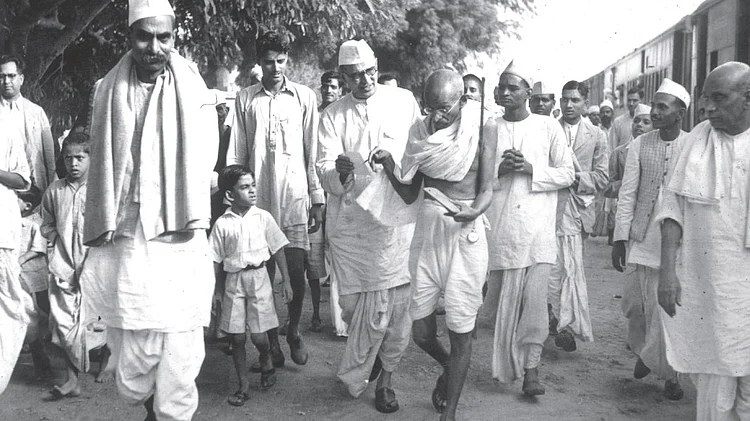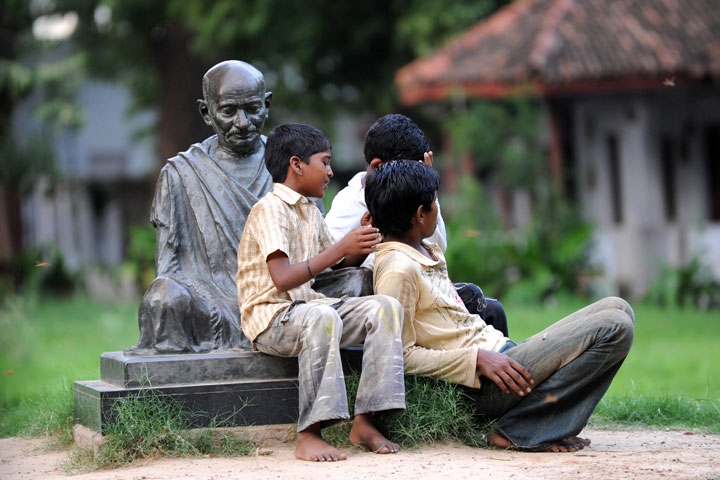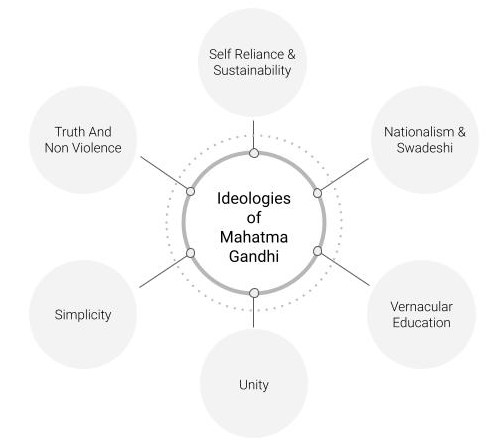Gandhi the pivotal figure in the development of Modern India.
Gandhi Ji was the folk hero and era builder of modern India. As a leader, he not only changed the Indian political stream and liberated the country from the bondage of slavery. But taught the whole world those moral values of truth, non-violence, peace, and harmony, which are equally prevalent in the 21st century and as relevant as then. Gandhiji was such an extraordinary revolutionary who never bowed his head in the face of tyranny and social injustice. He did not possess any hatred toward anyone. There is no such area of life where he has not guided the people.

Pics Courtesy: National Herald India
Gandhi as a Philosopher
The life of Mahatma Gandhi was a philosophy. Gandhism is a dynamic and evolutionary philosophy. In the words of Louis Fischer, Gandhi was a free-spirited and uninterrupted thinker. Although Gandhism is not committed to a particular cause, it has all the necessary characteristics for an issue. It’s a sure-life philosophy. Truth and non-violence are the essences or essential elements of this philosophy of life. There is only one soul in life, and its practical form is love or universal brotherhood, which is non-violent. What is true in principle is non-violence in practice.
Gandhism is the philosophy of life for building a new person and a new society. The alternative of Marxist bloody revolution is available to us in the path of Gandhian developmental revolution.
Kunal Kumar
Truth and Nonviolence: Vision for the New World Order!
When we think about Mahatma Gandhi, two things spring to mind: truth and non-violence, as he was a firm believer in both of these concepts. Gandhi, who was born on October 2, 1869, is named the Father of the Nation. As a lawyer, he employed truth and non-violence as tactics in India’s freedom movement against British colonial power.
Gandhi felt that truth is divided into relative truthfulness in word and deed and absolute truth – ultimate reality. This ultimate truth is God and morality and the moral laws and code that serve as its foundation. Non-violence, according to Gandhi, entails complete selflessness. It indicates that if someone wants to realise himself, i.e., seek the truth, he must act so that others will believe he is completely protected.
Truth is the Nirguna form, and non-violence is the virtuous form. Both are the two sides of he same Param Tattva. The path of non-violence is the path of love, which does not seek any kind of retribution from the beloved. The priest of non-violence only knows how to sacrifice and relinquish.

Gandhi: vision of the ideal society and state
Gandhian theory of the state is not only based on the principles of freedom, non-violence, morality, justice, and truth but also on decentralization. For him, swaraj and democracy are synonymous, but decentralization must be a fundamental part of democracy.
Based on truth and non-violence, he envisaged the ideal state of “Ram Rajya”. That state would be a humanistic governance system where every individual would be so restrained and self-disciplined that the state would no longer need the law. He believes that the state is the best, which rules/governs the least. Gandhiji propounded the policy of centralization to build an ideal society.
The economy of the village
Gram Panchayat’s arrangements in the area of governance and cottage industries in the area of economics are recognized by him. The spinning wheel is a symbol of their decentralized economic system. To end exploitation in society, Gandhiji emphasized the need for principles of Asteya (Non-Stealing) and Trusteeship. His belief is that true civilization lies in consciously decreasing the needs, not in increasing them. He also had the belief that by adopting the policy of change of heart, we can persuade the capitalists to invest their wealth in social service work. The process of distribution of goods is possible only through the principle of trusteeship.

Leo Tolstoy and Mahatma Gandhi’s Relationship
Gandhi and Tolstoy were two of the most prominent proponents of nonviolence as a way of life and resistance strategy. According to Gandhi, Tolstoy’s The Kingdom of God is Within You (1893) “made an indelible mark” on him. The Russian’s concept of “love as the law of life” and concern for all humanity deeply affected him. Gandhi named his second ashram in South Africa after Tolstoy, where he experimented with Satyagraha methods.
Gandhiji was a strong supporter of Tolstoy’s theory of labour for bread. This principle is that every healthy person should do physical labour to fulfil their needs. The principle of labour for bread will make people self-reliant and fearless. In summary, we can say that the main elements of Gandhism are rationalization, economic system, asteya, trusteeship, the concept of bread Labour, and a stateless society. Adherence to these principles will give Gandhiji’s non-violent state the form of a spiritual democracy in which the individual will have the highest position. Gandhiji believed in the “means”. He considered the means and the end inseparable and loved the Machiavellian Perspective regarding “the ends justify the means”.

Gandhi’s Means and Ends in Politics
“There is just the same inviolable relationship between the means and the end as there is between the seed and the tree,” as observed by Gandhi ji. Gandhi’s worldview is distinguished by incorporating morality into political and social life. Whereas he believed that truth, nonviolence, and the purity of means were necessary for personal life, he also thought they were essential for intelligent existence. Gandhiji used Satyagraha to use moral measures to combat political malpractices and injustice. In his opinion, injustice thrives only when we participate in it. It will not be able to survive for long if we do not cooperate with it. The goal of a Satyagrahi should not be to destroy your opponent but to cause a mental shift in him so that he abandons the road of others.
For me, it is enough to know the means. Means and end are convertible terms in my philosophy of life.
Young India, 26-12-’24, p. 42

Interlude is first heard by a person of his peculiar character, and his heart transformation comes first. That person then listens to that voice and confronts his brothers by taking the side of the truth. He was not even a fatalist; he believed in the principle of karma and used to declare that evil deeds must be punished. Although he underlined that man is the subject of his destiny. His ideal is the Gita’s Nishkam Karma. It would be an exaggeration to say that he was a karma yogi.
Gandhi’s Nonviolent Principles: An Interpretation for Today’s World
Today Gandhiji’s beliefs are acknowledged internationally. Nevertheless, just as a coin has two sides, some individuals are skeptical of his principles and claim that Gandhian ideology has become a thing out of context. In response to this mentality, the adage began, “The name of compulsion is Mahatma Gandhi.” However, no one attempted to grasp Gandhism thoroughly and sincerely.
“I have nothing new to teach the world. Truth and non-violence are as old as the hills. All I have done is to try experiments in both on as vast a scale as I could.
M. H. Gandhi
Gandhism not only teaches us some life ideals, but it also teaches us a logical and just method of living. Each person’s life is his own unique truth, and his faith shapes it into life. It is man’s birthright to act following his self-awareness, and Gandhism teaches us to be fearless. Every country in this war-torn era wishes for a world union. The only way to realise this ambition is to abandon all forms of fear and mistrust in favour of Gandhian nonviolence. We are entirely free of their terror because we have chosen the road of nonviolence. Every nation in the modern age talks about disarmament, but its political stakes are messed up. Every country in the contemporary age talks about disarmament, but its political stakes are messed up. Many of our problems can be solved without using political terminology if our leaders follow the road of compassion.

Conclusion
Gandhian life, which promotes human holiness and equality, might benefit us. By adhering to Gandhian ideas and aspirations, the dream of world peace will be fulfilled. The Panchsheel principle, advocated for world peace by Prime Minister Nehru, is an earlier type of Gandhian thinking derived from the thought traditions of Buddha and Mahavira. Can’t we apply this approach on a national scale? If Indians do not follow his values in thought, speech, and practice, how can we impart Gandhism to the rest of the world?
However much I may sympathize with and admire worthy motives, I am an uncompromising opponent of violent methods even to serve the noblest of causes…. Experience convinces me that permanent good can never be the outcome of untruth and violence. Even if my belief is a fond delusion, it will be admitted that it is a fascinating delusion.
Young India, 11-12-’24, p. 406
You may also like this Living to the fullest: Life as we see it!
About the Author

Kunal Kumar
Kunal Kumar is the Co-Founder of the international prism. He was previously associated as content curator for Lawviapods & is now the editor in chief of the column on Exploring Life in the international prism.
He did his graduation from Dr. Ram Manohar Lohiya National Law University, Lucknow. In addition to being a fitness fanatic, he is also passionate about swimming, trading in Index options, Futures& Equity Derivatives.
He can be reached at kunal@theinternationalprism.com






